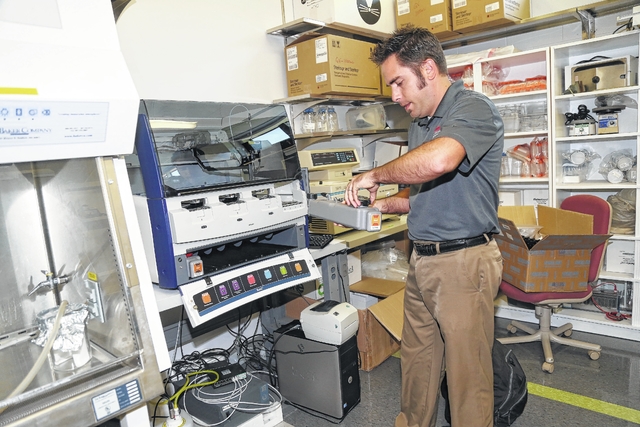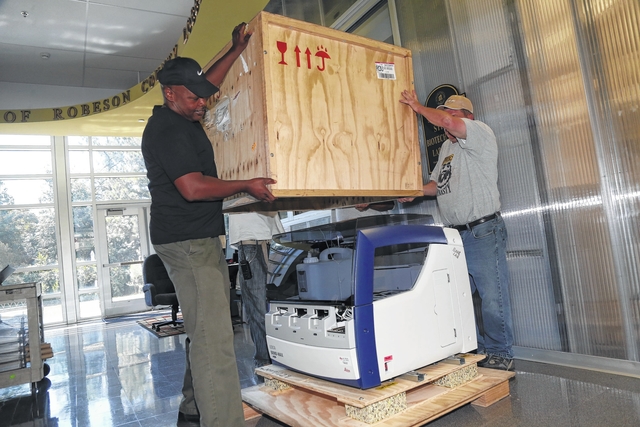PEMBROKE — A shipping crew was at UNC Pembroke last week to pack up an automated pathology machine used to test brain tissue.
The workers carefully placed the $80,000 machine inside a wooden crate. They double and triple-checked the package making 100 percent sure it was fastened in place considering it is being shipped 8,000 miles away to Malawi.
There, the machine will be used to save lives.
UNC Pembroke donated the Leica Bond Max Machine for Immunohistochemistry and In Situ Hybridization to UNC-Chapel Hill’s site in Lilongwe, Malawi. University officials say the machine will not only save lives, but improve lab operations in Malawi.
These particular instruments will allow the laboratory at UNC Project-Malawi to obtain more detailed information about the tumors that are diagnosed in patients there. This information improves the accuracy of the diagnoses the pathologists make, which in turn helps to ensure patients in Malawi are being treated appropriately.
The machine left for Malawi in late July.
“Service and collaboration are core values at UNC Pembroke, so I commend Dr. Ben Bahr for seeking out this opportunity to help fulfill an important need,” said Chancellor Robin Gary Cummings. “In addition to maximizing state resources, this partnership allows UNCP to significantly impact lives on the other side of the globe.”
The equipment donation was born out of a collaboration between Ben Bahr, Ph.D., William C. Friday Distinguished Professor of Molecular Biology and Biochemistry at UNC Pembroke, and Stephanie Montgomery, DVM, Ph.D., assistant professor of Pathology and Laboratory Medicine at UNC-Chapel Hill.
While working together on the pathology of Alzheimer’s disease, Bahr noted the machine was underutilized in his laboratory and would like to see its potential fully maximized. Months later, Montgomery learned of a need for the machine by UNC-Project-Malawi and contacted Bahr.
The machine had been housed at the Biotechnology Research and Training Center at COMtech outside of Pembroke.
“I think it is important that we make sure this machine is being utilized for the best operation to help people,” Dr. Bahr said. “It can be used to train a few students, but it could not be used for our types of brain slice experiments.”
Bahr said it is gratifying to know UNC Pembroke is providing a much needed resource to lab technicians in Malawi.
“It is very exciting to be part of this worldwide effort and help people on the other side of the planet,” he said. “With this outreach project, it shows that UNCP is helping local people as well as people all over the world.”
“The impact the donated equipment will have in Malawi is significant,” said Nate Montgomery, M.D., Ph.D., UNC-Chapel Hill Department of Pathology and Laboratory Medicine. “The stains performed on these instruments are part of the standard-of-care here in the U.S., but there is only a very limited capacity to do them in Malawi. The instrument donated by Pembroke changes that. This gift will help bring an important tool to a place with far too few resources.”
The Leica machine provides automated staining, which will allow UNC Project-Malawi’s lab technicians to process more specimens. This is especially important as UNC Project-Malawi’s cancer clinics serve half the country’s population or between 8-9 million people, said Satish Gopal, M.D., MPH, UNC Project-Malawi Cancer Program Director.
“Neither the pathology lab nor immunohistochemistry existed in Lilongwe until UNC-Chapel Hill introduced them in 2012, and immunohistochemistry has now become a routine part of lab operations,” said Gopal.
“The automated stainer from UNC Pembroke will allow us to process even more patient specimens with higher efficiency, while freeing up our technicians to do many other vital lab functions,” he said.
“This is essential in a setting where per capita health care workforce is orders of magnitude smaller than the US,” Gopal said. “To handle the overwhelming clinical volume with limited trained staff requires high levels of efficiency, and the new instrument will be critical in this regard.”
Bahr said the transfer of the machine would have not been possible without the efforts of Chancellor Cummings and other faculty and staff at UNCP. They include:
Heather Romine, lab manager and research specialist for the William C. Friday Laboratory; Karen Swiney, director of Business Services; Travis Mosley, property coordinator with Business Services; and Mary Beth Locklear, director of the Office of Regional Initiatives.
UNC Pembroke is a constituent institution of the University of North Carolina system. For more information, contact Jodi Phelps, executive director of University Communications and Marketing, via email [email protected] or by phone 910-521-6863.


